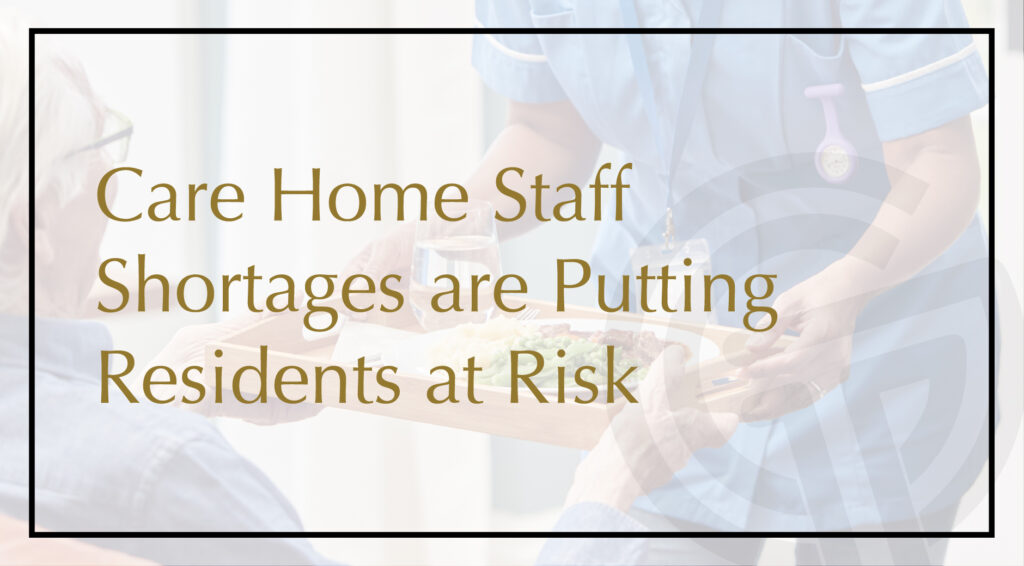Deciding it’s time for an elderly person to move into a residential, nursing or care home is an enormous and difficult decision for families and decision makers and selecting a care home that they know will keep that person safe and healthy can be an added challenge.
Despite care homes having to adhere to fundamental standards that are checked and supported by the Care Quality Commission (CQC), it’s often reported that residents are in fact not safe due to poor standards of care leading to health issues, deterioration of conditions, and even death.
The BBC recently reported on “shortcomings in care” that lead to the death of four residents at a home in Cambridgeshire. The CQC found the service at the home to be inadequate in all measurements and has closed the home because “people were not safe and were at risk of avoidable harm.”
Not enough care home staff
As with many facilities that require healthcare workers, care homes are on the list of places that are incredibly short staffed. The Guardian revealed that on average, homes are around 30% understaffed and a number are closing their doors to new admissions. “The figures came as MPs and peers were told that staff shortages in social care had worsened the lives of people who live in care homes and increased the risk of undernourishment and dehydration,” explains The Guardian.
What can go wrong if care homes are short staffed?
It is the care home’s responsibility to ensure its residents are safe, nourished, clean, and well taken care off. Most residents in a care home require daily medication, assistance with getting out of bed and getting dressed, help with using the toilet, as well as at mealtimes and often with mobility which is why there is a required ratio of carers to residents is important. If that ratio isn’t met, things can start to go wrong.
- Pressure sores
If a resident is left in the same position in bed or in a chair for an extended period, they can develop pressure sores. A pressure sore will continue to get worse without proper treatment which includes dressing changes, regularly changing position, using a specially designed mattress, cleaning the wound and removing damaged tissue. If a pressure sore is not treated properly, it can lead to serious complications including blood poisoning. - Medication errors
Human error is unavoidable and medication mistakes can happen even when a home is fully staffed. However, being short staffed and having to deliver medications to every resident in a house can lead to processes not being correctly followed and the likelihood of an error taking place goes up significantly. - Falls
Without enough carers on shift, the chances of a fall happening go up considerably. A resident may try to walk somewhere unaided and slip, trip, or lose balance leading to a fall that could easily have been avoided if staffing numbers were at a safe level. - Missed illnesses/diagnoses
A resident may be suffering with an infection or other illness that could easily be missed if there aren’t enough staff to recognise and report symptoms. A missed infection in an elderly person can lead to a very quick and severe decline in health. - Dehydration
Ensuring residents are drinking enough is crucial. Dehydration in anyone can be dangerous but in elderly people especially, it can be deadly. - Malnourishment
Getting enough calories into residents can be a challenge at the best of times and without the required number of staff to ensure everyone is eating enough, residents may begin to lose weight which can add to health problems.
What is being doing about care home staff shortages?
According to the report by The Guardian “The Department of Health and Social Care (DHSC) has provided councils with additional funds to pay bonuses to retain staff, and late last month it extended the visa programme for foreign workers to care workers, care assistants and home-care workers. Such measures, however, are yet to fill widening gaps in the workforce.” However, the problem is far from solved as care homes are still facing problems and care standards continue to slide due to staff shortages, putting more residents than ever at risk.
How TGA can help
When it comes to clinical negligence, a liability or breach of duty report compiled by a member of our nationwide network of associates will ultimately opine whether a breach of duty has occurred. Our associates undertake a thorough and comprehensive review of a claimant’s medical records, seeking out the key evidence, before presenting a report of their findings. If clinical negligence has occurred, our associates will present all the clinical evidence necessary.
Our experienced associates continue to ensure they are up to date with all current care standards, and as well as full length reports, we can also provide short form screening reports that help determine whether a claim should proceed, to answer questions raised in a timely manner and help determine claim proceedings.
If you would like to talk to our team about any of our services, please get in touch.




